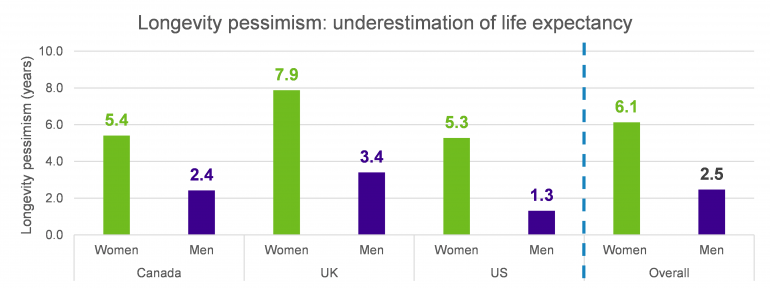Question:
How good are people at estimating their own life expectancy?
Answer:
It turns out, not very good!
On average, respondents to our recent Longevity, lifestyle and retirement perception survey, 2022 significantly underestimate how long they will live – exhibiting a phenomenon known as “longevity pessimism”. This is true for women and men in Canada, the UK and the US, with greater magnitude for women, the strongest effect in the UK and the smallest in the US.
The chart below shows the average differences between Club Vita’s calculated life expectancy (based on age, sex, ZIP code/post code/postal code) and survey responses to the question “To what age do you expect to live?”.

Source: Club Vita’s Longevity, lifestyle and retirement perception survey, 2022. A survey of 3000 people aged 40-60 across Canada, the UK and US. Full details in the report.
Key takeaways:
- Men and women across Club Vita’s three geographies on average all underestimated their life expectancy – exhibiting “longevity pessimism”.
- Longevity pessimism could significantly impact later-life financial well-being. If people underestimate how long they will live, they expose themselves to the risks of undersaving, overspending and running out of money in retirement.
- It also means they will undervalue guaranteed lifetime payment offerings such as annuity contracts or workplace Defined Benefit pensions
Club Vita's Longevity, lifestyle and retirement perception survey, 2022
We’ve explored the phenomenon of longevity pessimism and how it relates to levels of retirement savings and healthiness of lifestyles in our recent survey. You can download the report here:
Club Vita’s Longevity, lifestyle and retirement perception survey, 2022.
We presented the results of our survey as well as a discussion around behavioural drivers of mortality in one of our webianrs. You can watch that here.
Do you care enough? Behavioural drivers of longevity and retirement outcomes.
Erik Pickett PhD FIA CERA
Erik leads the dissemination of Club Vita’s insights and analytics. He began his career as a mathematician, working at a number of universities around Europe, while moonlighting as a part time street performer. He transitioned to the world of actuarial science in 2011, retaining his passion for engaging communication, training first as a pensions actuary with Mercer and Hymans Robertson and later specializing in longevity analytics with Club Vita.




